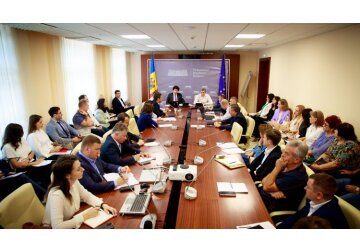
Public consultations were held in parliament on a bill that would introduce an obligation to present identification for any currency exchange.
The consultations were attended by deputies, representatives of the National Bank, the Service for the Prevention and Combating of Money Laundering, business associations, companies that work in the field of currency exchange, etc. The parties voiced their opinions regarding this bill, voiced problems and risks (stimulation of the “black” market for currency exchange and new types of fraud; the emergence of a new corruption channel; excessive collection of identification data of individuals, etc.), possible solutions. It was also noted that the law could be avoided by using, for example, foreign identity cards; and it is also necessary to guarantee citizens maximum protection of their personal data. It was separately discussed how and what personal data will be collected by currency exchange entities, and to provide options for currency exchange when a document has expired or an individual has forgotten/lost a document. During the discussions, it was proposed to ensure interaction between customs authorities and tax authorities and identify persons who import/export currency at different intervals; conduct “test purchases” of currency to check how the law works, etc. Representatives of companies that carry out currency exchange opposed the bill. One of the participants in the meeting reported that when asking for an identity card, citizens who initially wanted to exchange 800 euros prefer to sell 200-300 euros, and are also outraged that currency exchange office does not have the right to control their personal data. The author of the initiative, the head of the parliamentary commission on economics, budget and finance, Radu Marian, said that the goal of the project is to prevent money laundering and the financing of organized crime, and not to control every currency exchange operation by citizens of the country. He also noted that the project also supports the authorities’ intention to promote non-cash currency circulation in the future. “Purchasing an apartment for 50 thousand euros in cash – this happens, but we must encourage people to abandon this practice. The same applies to using an ID card,” Marian noted. Recall that in August the parliament approved in the first reading amendments to the Law on Prevention and Combating Money Laundering and the Financing of Terrorism. According to the changes, all cash currency exchange operations, regardless of the amount exchanged, will be carried out only with identification documents, and currency exchange points will be required to register all this data. Currently, the law provides for the obligation to present an identification document when exchanging currency worth more than 10 thousand lei. The bill is to be approved in the second reading.// 14.09.2023 — InfoMarket.







